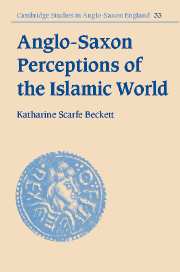Book contents
- Frontmatter
- Contents
- Acknowledgements
- List of abbreviations
- 1 Introduction
- 2 Islam during the Anglo-Saxon period
- 3 Anglo-Saxon contacts with Islam
- 4 Arabs and Arabia in Latin
- 5 Ismaelites and Saracens in Latin
- 6 Arabs, Ismaelites and Saracens in early Anglo-Latin
- 7 Pseudo-Methodius and the sons of Ismael
- 8 Arabs, Ismaelites and Saracens in Old English
- 9 Persisting theories about Saracens in post-Conquest England
- 10 Conclusions
- Bibliography
- Index
10 - Conclusions
Published online by Cambridge University Press: 22 September 2009
- Frontmatter
- Contents
- Acknowledgements
- List of abbreviations
- 1 Introduction
- 2 Islam during the Anglo-Saxon period
- 3 Anglo-Saxon contacts with Islam
- 4 Arabs and Arabia in Latin
- 5 Ismaelites and Saracens in Latin
- 6 Arabs, Ismaelites and Saracens in early Anglo-Latin
- 7 Pseudo-Methodius and the sons of Ismael
- 8 Arabs, Ismaelites and Saracens in Old English
- 9 Persisting theories about Saracens in post-Conquest England
- 10 Conclusions
- Bibliography
- Index
Summary
Perceptions of Saracens, Ismaelites and Arabs in Anglo-Saxon England were, to begin with, almost exclusively the result of literary engagement and not personal experience. Some experiential information can be found in, for example, Willibald's pilgrimage report, but these particular examples did not reach England during the period in question. Arculf's pilgrimage (which was read and used by Bede) appears more typical of the travel genre: Adamnán's report describes the holy sites first and foremost, drawing upon a variety of literary sources to do so, and includes information about Saracens only when their activities have impinged significantly upon the unquestioned rights of the Christians (whether for good or bad). His intention to show Christians and Christianity in a good light obscures the historical value of his comments on Saracens.
Saracens themselves were not given a voice in any texts surviving from this period, except, possibly, the Vita Willibaldi. Alcuin's reference to a Disputatio Felicis cum Saraceno may be evidence for an early form of religious dialogue, but the disputatio itself does not appear to have survived. A useful perspective on Christian literature about Saracens may be gained by comparing contemporaneous Muslim Arabic accounts of and references to Christianity and the West.
- Type
- Chapter
- Information
- Anglo-Saxon Perceptions of the Islamic World , pp. 223 - 243Publisher: Cambridge University PressPrint publication year: 2003

